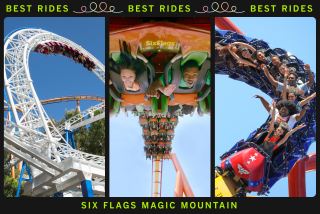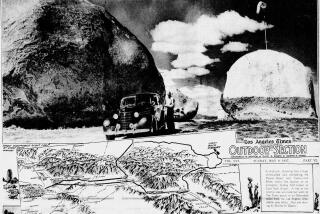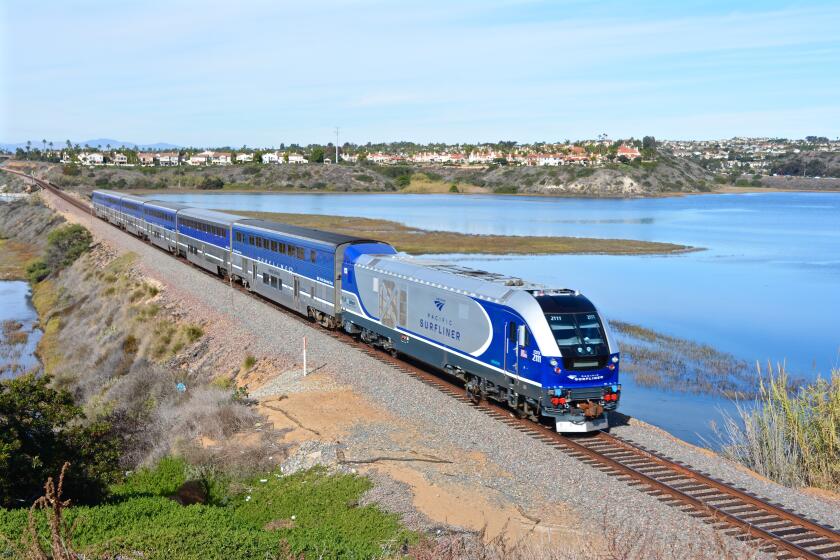Golden Spike event celebrates the Transcontinental Railroad’s 150th anniversary
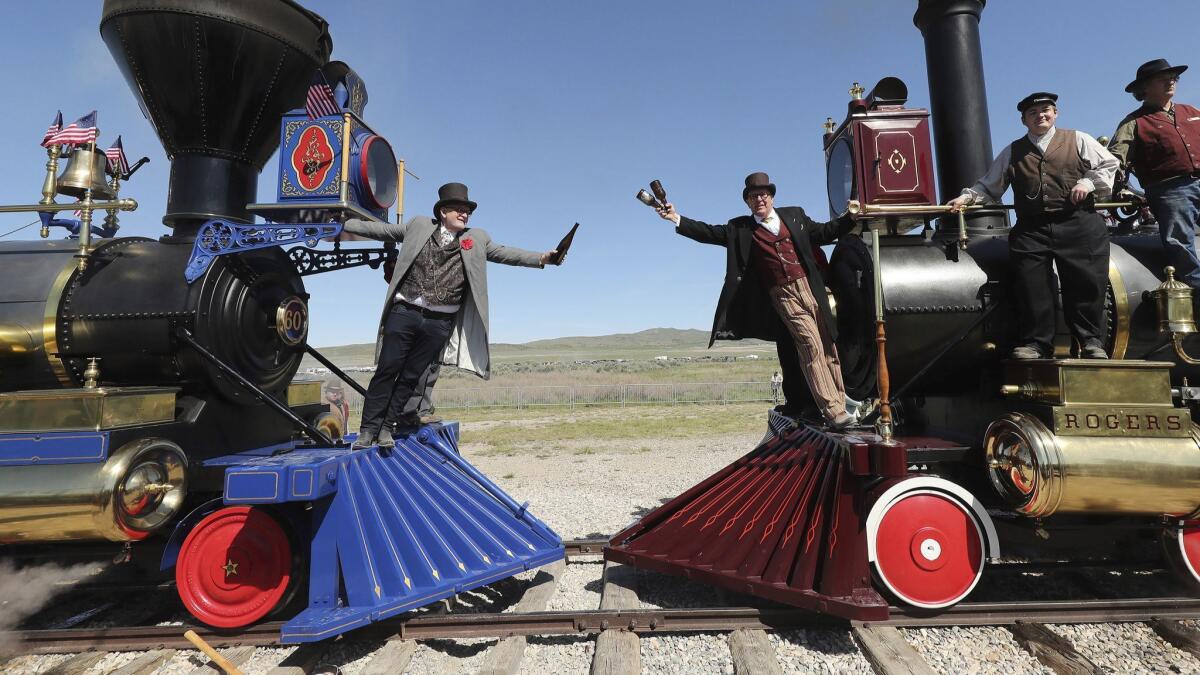
- Share via
“Dot, Dot, Dot. Done!” That message, sent 150 years ago Friday by telegrapher W.N. Shilling from Promontory Summit, Utah, set off celebrations as the driving of the Golden Spike completed the Transcontinental Railroad.
On Friday, at the Golden Spike National Historical Park at Promontory Summit, a reenactor keyed the same message. A crowd of thousands gathered to mark the most famous moment in American railroading and one of the seminal events in U.S. history, making May 10, 1869, a date to remember.
The three dots represented the final strikes of the silver maul tapping in the last spike. “Done” meant the completion of the Pacific Railway, linking Sacramento and Omaha, Neb., 1,776 miles, decades in the planning and six years in the making.
Celebrate the transcontinental railroad on a weekend escape in Utah »
The Central Pacific’s Jupiter from the west and Union Pacific’s No. 119 from the east, both steam locomotives, faced off.
On hand again Thursday were Jupiter and 119, this time replicas of the originals, built for the 110th anniversary in 1972.
They are tiny by newer standards, each weighing about 60 tons loaded with coal (No. 119) or wood (Jupiter), beautifully ornate, as were the originals.
Their whistles sang and bells rang to mark the beginning of the main ceremony
Bands played, a children’s choir sang, and the Postal Service sold first-day-of-issue stamps commemorating the event.
Among the dignitaries ange when confirmedwere Secretary of Transportation Elaine Chao, Secretary of the Interior David Bernhardt, Utah Gov. Gary R. Herbert and Lance Fritz, Union Pacific’s chairman, president, and chief executive. Reenacted figures included Central Pacific’s Leland Stanford, Union Pacific’s Dr. Thomas Durant and Gen. Grenville Dodge.
Pulitzer Prize-winning author Jon Meacham was the keynote speaker. The national anthem, bells, cannons and a flyover marked the ceremony’s culmination.
Hello, Big Boy
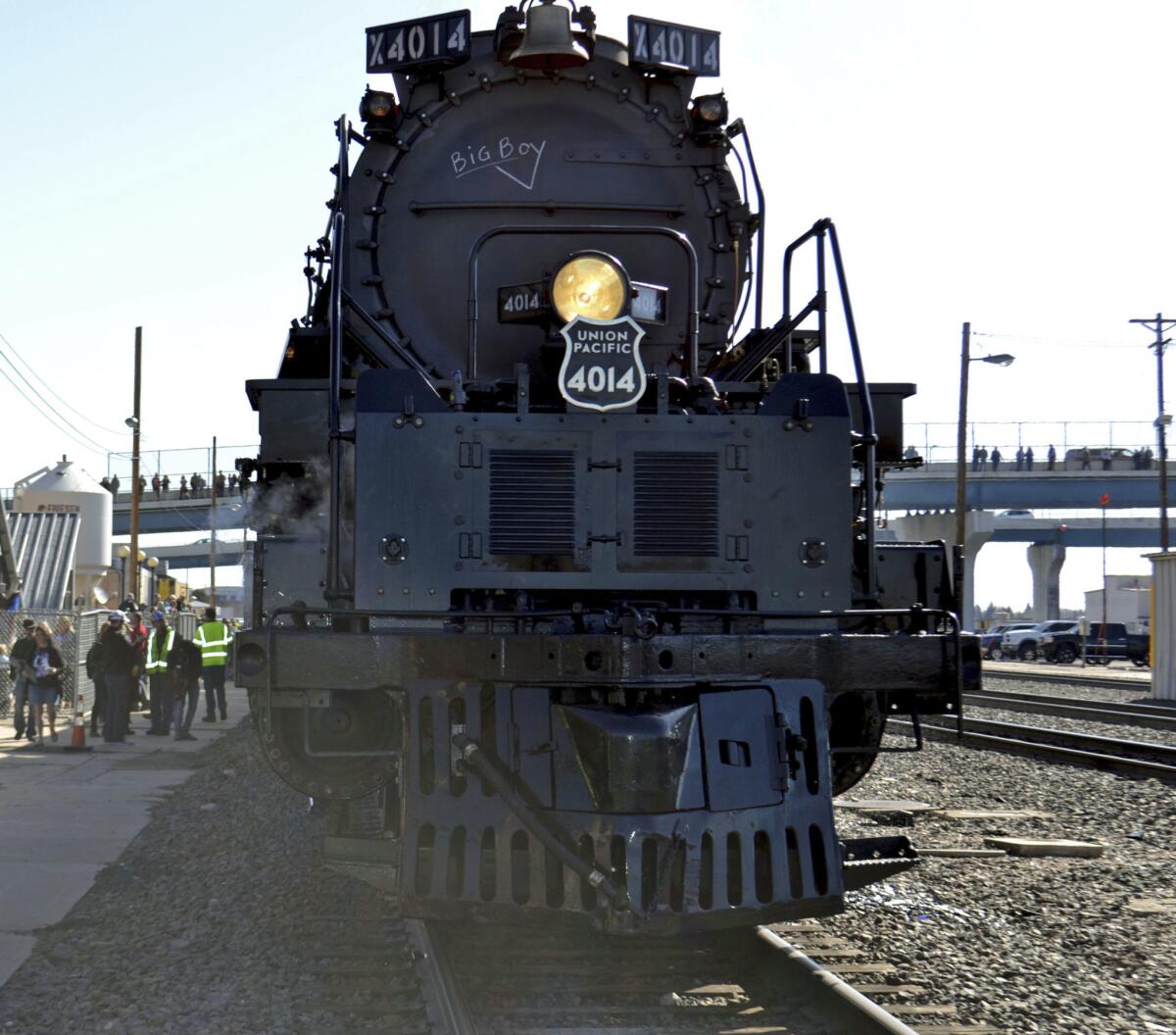
Remember the Chinese immigrants who built America’s first transcontinental railroad »
Golden Spike festivities had gotten off to a spectacular start six days earlier and 460 miles east in Cheyenne, Wyo., with the christening of No. 4014, one of 25 Big Boys, Union Pacific’s largest and best-known steam locomotives and with a connection to Southern California.
On a sunny Saturday morning, the massive locomotive, gleaming black, fresh from the restoration shop where it had spent more than two years, was wreathed in steam as it rolled to a stop in front of the depot.
That depot is now a museum, and 2,000 spectators had bought tickets to be there and cheer every blast of 4014’s melodious whistle. As many as 5,000 people gathered in Laramie, Wyo., the first stop on the locomotive’s five-day journey to Ogden, Utah, and thousands more came to trackside all along the route.
This behemoth, built in 1941 for Union Pacific, remained in service until 1959. So famous was the Big Boy that seven survive in parks and museums, but only No. 4014 has steam in its belly.
It had spent its retirement on display at the Los Angeles County Fairgrounds in Pomona until Union Pacific brought it home in 2014.
“Good morning, steam-town,” said Lance Fritz, Union Pacific’s head, in opening the ceremony. “We’re here to celebrate the Big Boy and our railroad’s long relation with Cheyenne.” Wyoming Gov. Mark Gordon also spoke, as did Cheyenne Mayor Marian Orr, who said the previous evening felt like Christmas Eve.
Fritz’s wife, Julie, helped him break a bottle of Champagne over 4014’s coupler. With Ed Dickens, head of the nine-member Steam Crew that performed the restoration, at the throttle, the Big Boy began its journey to Ogden, double-headed with another preserved Union Pacific steam engine, No. 844 — smaller than No. 4014 but still imposing.
Dickens played Big Boy’s whistle like an orchestra wherever spectators clustered. A miles-long motorcade of chasers jammed the highways.
After the celebration
Once the celebratory crowds have left Promontory Summit, the Golden Spike National Historic Park will return to its normal routines, with plenty to see and do. In season, the two locomotives operate under steam. The re-enactors perform on summer Saturdays and holidays.
The visitor center brings the long-ago triumph of the Golden Spike alive, with a video and displays of the primitive tools and light, flimsy rail that hastened this fragile railway across the West. There’s a replica of the golden spike; the original is normally at the Stanford University Art Museum..
Don’t miss the chance to drive the Central Pacific’s abandoned right-of-way on the West and East Grade Auto Tours.
Although I love the visitor center and the steam locomotives, a lonely drive along the old right-of-way brings me closer to an understanding of the vast, harsh, emptiness that faced the laborers. In their way, they were the heroes of the Golden Spike.
IF YOU GO
The Golden Spike National Historic Park is 32 miles west of Brigham City, Utah, which is 60 miles north of Salt Lake City on Interstate 15. The visitor center, museum, and bookstore are open year round (closed Thanksgiving, Christmas, and New Year’s Day) from 9 a.m. to 5 p.m.
Locomotive steam demonstrations run from May 1 through mid-October, and guided tours of the locomotives in the engine house are an excellent alternative during the balance of the year.
Reenactments of the Last Spike Ceremony take place on Saturdays and holidays from Memorial Day through Labor Day, and the auto tours are available year round.
Info: Golden Spike National Historical Park, (435) 471-2209
The Big Boy will operate occasional trips in the future, and the Union Pacific Rail Car will also tour around Union Pacific’s 23-state system. For details when they become available: Union Pacific Heritage Steam.
More to Read
Sign up for The Wild
We’ll help you find the best places to hike, bike and run, as well as the perfect silent spots for meditation and yoga.
You may occasionally receive promotional content from the Los Angeles Times.
